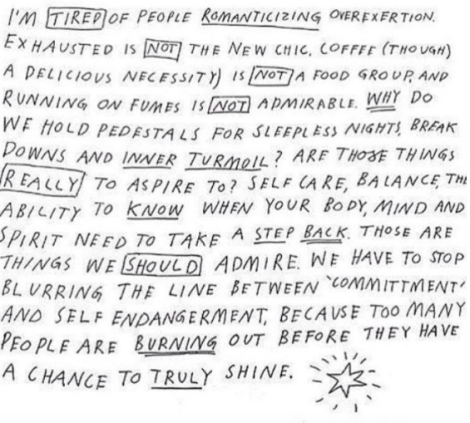As the newest crop of final year vet students eagerly enter the world of clinical rotations, I’d like to discuss something very important: the glorification of exhaustion and burnout that perpetuates a toxic work environment and acts as fuel for poor mental health.

You’ve all seen it. The Facebook statuses rhyming off an obscene amount of hours spent in the hospital during the week. The tweets about being so busy they didn’t get a chance to eat during the day. The exhausted looking #oncall selfies. And all of them emphasize how long the hours are and how hard they’re working… but simultaneously how #blessed and happy we are and how we wouldn’t trade it for the world.
I’m not sure what the goal of these posts are. Is it needing to feel validated? Is it wanting to belong in a profession that has a problem for glorifying burnout? I think it’s that we’ve been conditioned over the years to think that if you’re not physically, mentally, and emotionally spent at the end of the day/week/year… then you’re not really working hard enough. And so we have created a monster.
The profession has perpetuated this morbid “badge of honour,” which has only been exacerbated by the existence of social media. Constant deprivation of self-care for the sake of our patients or our learning may seem like it’s coming from the right place, but does it really make us better vets? Research (and logic!) would say, no. For example, a literature review on physician burnout identified strong evidence for implications of burnout on professional activities including increased incidence of medical errors and reduced empathy, as well as decreased patient confidence and satisfaction with their medical care and likelihood of following recommendations (Shanafelt & Dyrbye, 2012). So we think we are sacrificing ourselves for the good of our patients… but we’re really doing the opposite.
I’m not introducing these facts as breaking news. In fact, most of us logically know that taking care of yourself makes you a better professional. So what is holding us back? The answer to that is culture.
I bring to you another Shanafelt & Dyrbye study, this one from 2016. It is another literature review on burnout in the medical field that identifies this key fact: Learning or work environment and culture within the school or clinic are the primary contributors for burnout, rather than personal characteristics. Therefore, it maybe doesn’t matter as much how resilient you are or aren’t – the culture that surrounds you has the biggest effect on your well-being. And we all play a role in contributing to that culture.
Look, lots of people handle the stress of clinical year fine… and maybe you are one of those people! But many students experience extreme stress, burnout, breakdowns, and relapses of mental health conditions that were thought to be under control. I would say it’s impossible to do clinical year without compromising at least some of your healthy living habits – be it exercise, enough sleep, healthy food, time to spend on hobbies, or ability to be with loved ones. If we stopped judging each other based on what time we leave the hospital, then we could embrace strategies to share the workload and be healthier.
Everyone should be able to put in the number of hours they feel is adequate for their learning or well-being and not be judged by others. By glorifying the long days, the exhaustion, and the burnout, we perpetuate stigma about getting help for mental health. Many studies show that perceived stigma negatively effects help-seeking and can worsen mental health conditions. Instead of perpetuating the “toughen up” attitude, I challenge you to be more open to reaching out to others you think are struggling, and to speak frankly and bravely about feelings of burnout, inadequacy or poor mental health. The world will be a better place for it.
Stop scoffing at “easy rotations” which have reasonable hours. Don’t immediately shut down the idea of a wellness based rotation, and belittle it’s value to being the “yoga rotation.” And most of all, stop defining your worth as a student and as a professional by the hours you spend in a building.
Look, I know that this is about more than just social media posts. There are also huge challenges at the institutional level that need to be addressed. The fact that students are even allowed or expected (or pressured) to keep these ridiculous hours is an issue on its own. I know culture is extremely ingrained and takes a long time to change. But we need to take steps now at the individual level to address the mental health crisis in our profession. And this is an easy one….
My challenge to you, Class of 2019, is to put an end to the social media posts documenting the exhaustion and the long hours of clinical year. Challenge yourself to take a pause before posting, and instead contribute to a more supportive and less judgmental working environment, for the good of everyone.
References
Shanafelt, T., & Dyrbye, L. (2012). Oncologist burnout: Causes, consequences, and responses. Journal of Clinical Oncology, 30(11), 1235–1241.
Dyrbye, L., & Shanafelt, T. (2016). A narrative review on burnout experienced by medical students and residents. Medical Education, 50(1), 132–149.

It is sad how we as students wear exhaustion as a badge of pride. We need to catch ourselves and look at why we think it is appropriate to feel utterly defeated so often.
I have personally felt inadequate and ashamed when needing to take a day off, or even just a morning to catch up on some sleep. Something’s gotta give…
LikeLiked by 1 person